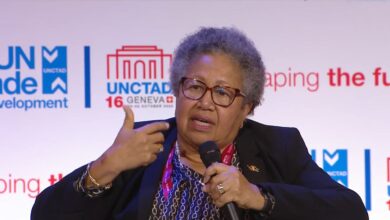(CARICOM Secretariat, Turkeyen, Greater Georgetown, Guyana) Prime Minister of Saint Lucia, the Hon Stephenson King wants “all hands on deck” for what he considered “tough negotiations” in the run up to the Fifteenth Meeting of the Conference of Parties (COP15) to the United Nations Framework Convention on Climate Change slated for Copenhagen, Denmark in December 2009.
The Saint Lucia Prime Minister, who has Lead responsibility for Sustainable Development in the Quasi-Cabinet of the Conference of Heads of Government of the Caribbean Community (CARICOM), told the 30th Regular Meeting of the Conference on Saturday, that all Heads of Government would need to play an active role; be fully represented in the negotiation process leading up to Copenhagen, where critical global decisions would be made, and ensure that the targets in the new Agreement at COP 15 were favorable to CARICOM Member States.
Prime Minister King called for a common position on Climate Change for the Caribbean, noting that four critical areas that must be addressed in the negotiations were the reduction of Green House Gas (GHG) emissions; mitigation and adaptation; the transfer of technology; and renewable energy.
In urging the Region to adopt a programme to advance renewable energy, Prime Minister King pointed to initiatives being carried out in Saint Lucia, St Kitts and Nevis and Dominica, and underscored the importance of creating at the national level, “an enabling environment for renewable energy through policy formulation and review of electricity supply legislation.” In this regard, the Prime Minister emphasized that “we need leadership from the Climate Change Centre as well as our universities.”
Commending the work of the CARICOM Task Force on Climate Change and Development and the Caribbean Community Climate Change Centre (CCCCC), Prime Minister King called on his colleague Heads to give both bodies support and also to endorse the positions of the Alliance of Small Island States (AOSIS) and the Caribbean interests within the Group of 77.
Climate Change, the Lead Head of Government said, presented a major challenge to our survival. However, “we must not despair but rather look for the opportunities where ever they may be.” He was convinced that although “we are small in size … we have shown through the years that we can stand up in the face of adversity and not just survive, but thrive.” “Let us therefore stand united to face this challenge,” he concluded.
Prime Minister Stephenson King joined a chorus of voices which had been calling for consensus and a consolidated approach to the Climate Change negotiations since the Summit opened on Thursday, 2 July in Georgetown, Guyana.
Prime Minister of Belize, the Hon. Dean Barrow had lamented that the “Developed World” had not given the Region adequate support in what he said was a matter of life and death, especially to Small Island Developing States (SIDS). Yet he was optimistic that, as in the case of other crises, the Region would surmount this challenge if it remained united in its approach and strategies. “Despite the hammer blows of this unprecedented crisis then, bright prospects and sunlit vistas will continue to be part of both our topography and our psychology,” he said on Thursday.
Similarly, Prime Minister of Grenada, the Hon. Tillman Thomas agreed that the Region needed to face the challenge head-on, to ensure the provision of financing to assist vulnerable countries in adapting to Climate Change. For this to happen, however, he stated that there must be a regional consolidated approach to the preparations for Copenhagen, and pointed to the Draft Regional Strategy developed by the CCCCC for achieving development that was resilient to Climate Change, as one that had the potential to provide the foundation for such an approach.
In response to the calls, Heads of Government on Saturday, noted the progress of negotiations of a new global Climate Change Agreement and issued a Declaration in which they agreed to the Region’s priorities as outlined by Prime Minister King.
They reiterated their commitment to the work of the Intergovernmental Panel on Climate Change (IPCC) and called on all Parties to ensure that the UNFCCC decisions were guided by that work. The Heads of Government further agreed to a common regional approach to address the threats and challenges of Climate Change, and of the full and effective participation of the Region in the preparatory processes as well as in the upcoming Conference.
In the Declaration, the CARICOM Heads also asserted that the global response to Climate Change should be undertaken on the basis of common but differentiated as well as historical responsibility and that it should not compromise the ability of SIDS to pursue sustainable development. They were adamant that the sharing of the cost of addressing Climate Change should be equitable and should not perpetuate poverty.





